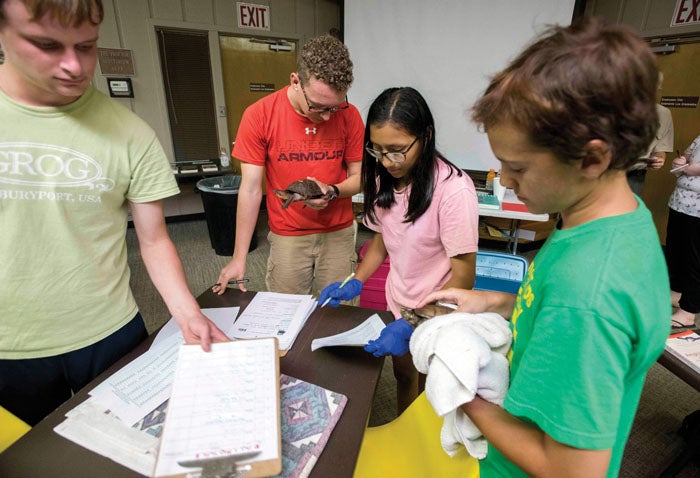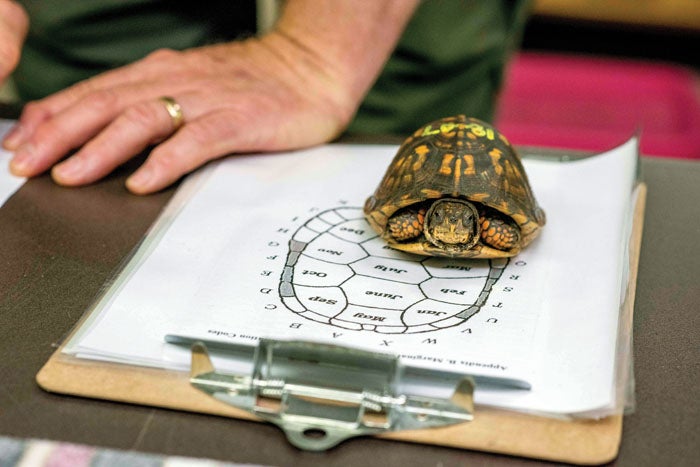Hearts beat for herps: Dan Nicholas holds herpetology camp
Published 12:00 am Thursday, June 21, 2018
SALISBURY — When no one is watching, the turtle makes a break for it.
Contrary to what “Aesop’s Fables” would have you believe, box turtles can book it. But this one doesn’t make it far. Just a few moments after it starts scampering across the carpet, Maria Hudson scoops it up, placing the turtle back on a towel to be observed, measured and marked.
“This one’s the active one,” she says.
Hudson is one of several high school students participating in the H.E.R.P. Project Camp at Dan Nicholas Park this week. H.E.R.P. stands for Herpetology Education in Rural Places and seeks to teach high schoolers about reptiles.
“So what we’re doing is inviting some high schoolers to immerse themselves in herpetological studies for four days,” said Mike Lambert, director of Dan Nicholas Nature Center.
Students spend the week studying lizards, box turtles, aquatic turtles and snakes using a curriculum designed by professors at the University of North Carolina at Greensboro. The H.E.R.P. Project, Lambert explained, is the result of a grant the university received. Once funding ran out, UNCG invited organizations and professionals like Lambert on board to spread the love for slithery and scaly critters. This is the second year Dan Nicholas Park has hosted the project.
Reptiles, or “herps” as Lambert calls them, often get a bad rap.
“(People) consider them a lower life form,” he said. “… Some people think we don’t really need them period on the planet.”
But herps are an important part of many healthy ecosystems and “fit into the chain.” Just like any other animal, they do their part to keep their neighboring species healthy and their ecosystems balanced.
It’s this information, as well as exposure, that Lambert hopes to impart to students this week. If more people were familiar with herps, the roles they play in the wild and their habits and mannerisms, Lambert said, they’d see that there’s nothing to fear.
“I think what helps fear is knowledge,” he said.
The small group at Herp Camp was eager to learn.
On Tuesday, students worked hard to measure and mark box turtles — logging age and sex and using a file to place shallow grooves on the outer edge of each shell. The markings will help other herpetologists identify and track the turtles later.
Unlike their log-sitting cousins, box turtles are terrestrial — a fact that can put them in danger more often than other types of turtles.
“Box turtles in particular are very vulnerable to habitat destruction and degradation,” Lambert said.
Box turtles are often seen making their slow, plodding way across roads. In fact, several turtles up for observation Tuesday had been discovered near or on roadsides around the park — places they’ll be returned to once the students finish their studies.
“Turtles have a home territory, so they need to be released very close to where you found them in the wild,” Lambert said.
For students, the four-day camp was a chance to deepen their love for all creatures great and small.
“I really love animals,” Hudson said. “… You can just really relate to them. Some people say they can be mean, but they have feelings too.”
Hudson, a student at Carson High School, said she’s always loved animals but that they became a passion when she got to help her middle school science teacher care for classroom pets.
While Hudson isn’t thinking about a career in veterinary science, other students are. Honor Belton is one of them — but she’s also considering zoology. In addition to a fun learning experience, H.E.R.P. Camp is helping her figure out her future.
“So this is helping me put my foot in the door more,” she said.
As a vet, she’d deal mostly with furry, fluffy creatures; but as a zoologist, she’d get to work with and study all kinds of critters.
East Rowan High School student Mason McMillin also hopes to become a vet. He said he enjoys working with all kinds of creatures. H.E.R.P. Camp, he said, has only deepened his appreciation of the natural world.
“It doesn’t matter what kind of animal it is,” he said. “They’re all different. They’re all unique in their own ways.”
Contact reporter Rebecca Rider at 704-797-4264.






